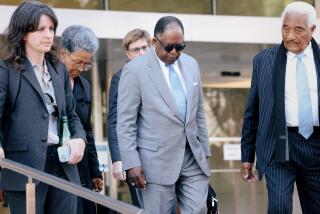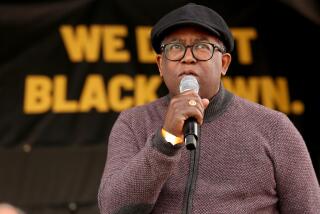Foremen in Trials Not Upset by Ex-Mayor’s Freedom
- Share via
Richard Stark has no regrets about the job he did as foreman of the jury that convicted Roger Hedgecock a year ago. But Stark said he has developed a curious aversion to courtrooms.
“I always want to go back down and walk into a courtroom,” Stark said in an interview. “I just haven’t been able to do that. . . . It’s like when you get sick from a certain food, you don’t want to eat that food again.”
Stark said he is not bothered by the success Hedgecock has found as a radio talk-show host or by the former mayor’s ability to remain free while he appeals his conviction on 13 felony counts.
“It doesn’t upset me in the least that he’s not in jail,” Stark said. “I don’t have any strong feelings that I should rush out and demand that they do something with the gentleman. We did our job. Now, it’s up to the judicial system to follow up and do their job.”
Thomas Furtak, foreman of the jury whose 11-1 deadlock ended Hedgecock’s first trial 20 months ago, has a similar view.
“I was there to judge the evidence and come back with whether the evidence supported the case for the prosecution, and it did,” Furtak said.
“I don’t know that they were that heinous of crimes. Nobody was hurt by it. He (Hedgecock) was going against the laws of the City of San Diego and only the City of San Diego. Some other cities don’t have those rules.
“It’s not a case like murder or rape or something violent, or even a massive scheme like J. David Dominelli was, where he actually defrauded people and probably took some people’s life savings. I don’t feel bad that he’s not in jail.”
Both foremen said the experience of trying San Diego’s mayor hardly changed them.
“It hasn’t left any scars on me,” Stark said. “I don’t have any whip lashes on my back or anything like that.”
Since the end of Hedgecock’s second trial, Stark has retired from his job as a banking executive. He had planned to make that move more than a year ago--until he was appointed to the jury just three days before his 55th birthday. He stayed on the job through the trial, then delayed his retirement an additional six months before finally stepping down Sept. 1.
Stark now sells real estate out of his University City home, taking vacations at his cabin in the Cuyamaca Mountains and putting around the local golf courses. He said he doesn’t spend much time fretting about the Hedgecock case or the attacks on the jury’s credibility after the verdict.
Stark said he isn’t bitter toward Stanley J. Bohensky, the juror who alleged that a bailiff had tampered with the panel’s deliberations.
Though the first Hedgecock jury got together for a pot-luck dinner, the jury that convicted Hedgecock hasn’t had any reunions, and Stark said he hasn’t spoken to any of the other jurors since December.
“At the end of the trial, they gave out a big sheet of names and phone numbers,” he said. “Everybody was going to get together and have a drink or something, and I haven’t heard from anybody. . . . It’s just like in the Army, where you get everyone’s name and address before you go off to combat. You have good intentions, but you just don’t get together.”
Furtak, a Rancho Penasquitos resident who works in data processing for Great American Savings, said he often listens to Hedgecock’s talk show while he’s working.
“The only thing I take exception to is probably his refusal to admit any knowledge or guilt in his association with the consulting firm,” Furtak said. “He’s addressing an audience that’s quite large. There’s really only 24 people (the jurors) who know any different, who had access to the evidence in the case the way we did.”
Stark said he has spoken to more than a dozen civic and educational groups about his role on the Hedgecock jury, but Furtak said his involvement in the mayor’s saga rarely comes up anymore. He said he almost never thinks about Leon Crowder, the city sanitation worker who was the lone hold-out blocking Hedgecock’s conviction in the first trial.
“It’s pretty much gone by the wayside,” Furtak said.
More to Read
Sign up for Essential California
The most important California stories and recommendations in your inbox every morning.
You may occasionally receive promotional content from the Los Angeles Times.













